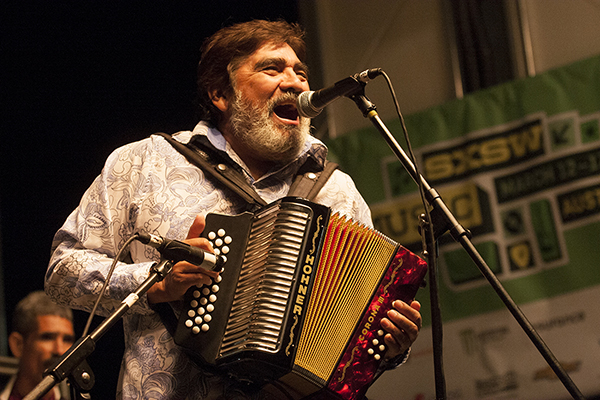At 66, Celso Piña is very often on tour, but that seems far from bothering him. After travelling and playing in Mexico (DF, Guadalajara and Toluca), then the south of the US (Victoria, Dallas and Denver), and back to Mexico...he’s having a rest in his hotel room when I ring. I’m talking to him thinking it’s kind of like being reunited with a very welcoming uncle who you are not sure still remembers you…
“Hola Santiago, thank you very much for your time and for your interest in what we do”, he says in Spanish with a warm, unaffected voice. Throughout the interview he will strike me as a teacher, a maestro, someone who has lived through and reflected on so many experiences; a compelling storyteller with the depth of introspection.
He tells me that the Piña family lived around the area of Nuevo Repueblo and Colonia Independencia, in a heavily populated area of Monterrey (Nuevo León) in the north of Mexico. Celso was the eldest of nine siblings from a poor family that had moved from the small village La Boquilla to the big provincial city. Celso was six when started to work to help support his family.
His father bought Celso his first accordion and also helped to build congas and other percussive instruments for Celso’s younger brothers (Enrique, Rubén and Eduardo), who would join in the musical enterprise.
You always mention your father as an important figure, how was that?
“My father not only bought my first accordion, he encouraged me to play the music I wanted to play: Colombian cumbia and vallenato. At the time that was not easy. I went to see two accordionists, I showed them a tape with vallenato recordings and said, ‘I want to play this, can you teach me?’ And the both told me, ‘take your tape, I can’t teach you that’. I remember I very sad, because I then had the accordion but I couldn’t play it, and my dad, again, told me, ‘You can teach yourself. This is what you love to do, there’s no rush, so teach yourself. And so I did, it took me three years of very hard work. There were no Internet tutorials then but only tapes.”
Celso’s mother was not that positive about a music career for her son, in particular when Celso decided to quit his permanent job in pursue of his dream.
And now, Piña and his band, the Ronda Bogotá, have found success on the back of such a unique sound that it makes you wonder how it could ever have been any different. His sweet voice, button accordion and preference for ‘foreign’ sounds had earned him the nickname rebelde del acordeón (the accordion rebel) quite early in his career, a name he obviously didn’t mind, as he went on to add electric guitars and an overall rock and roll, hip hop
What is it that made you change the music landscape not once but twice? I ask.
“To me, Santiago, music is infinite. Like numbers, the more you search the more you find. I’ve always been very restless. I was very young and was already trying to do different things with the bands I was in. I didn’t want to play the same music everyone was playing in Mexico, but it was very difficult to convince other people to do something different. Then someone told me, ‘to do what you want to do you need to form your own band’. And that was true because it was very difficult to get people to do something different’.
That was when Piña started to slow-cook the idea that would materialise in the Ronda Bogotá in the 1980s, the band he formed with three of his brothers, and which still accompanies him today (although with changes in membership). Fond of the music of Colombian artists Alfredo Gutiérrez, Aníbal Vázquez, Aniceto Molina, Diomedes Díaz, Calixto Ochoa and Lisandro Meza, he then decided he would play tropical music.
“‘Why do you want to play that’, other musicians kept asking me for years and years, until people started to follow us, and then they got it and started to copy us”.
In his 40-year-long career el rebelde del acordeón revolutionised Latin American music two times, literally. The first was in the early 1980s, when Piña brought mixed Colombian cumbia and vallenato with the typical norteña music. Until then the sonideros (nightclubs located in the barriadas, or popular neighbourhoods) used to play northern rhythms such as polka and corridos. Piña let the sounds of his region infuse his cumbias and vallenatos creating a new sound that also gave him his first hit song, with “La manda” (version of a vallenato by Adolfo Pacheco). And then he did it all over again 20 years later….
Yet, Piña’s story is not more that of a music hero or a romantic than is one of a realistic person struggling to survive in a complicated environment. Piña’s musical ingenuity is accompanied by his tenacity, his struggle to differentiate himself from the rest. Victim of his own success, through the 1980s and the 1990s the sound of Ronda Bogotá was copied endlessly by a number of bands that sometimes lowered the standards and always, the cachet prices.
When in 2001 Piña’s album Barrio Bravo added to the mixed the urban sounds of rap and hip-hop, reggae, ska and distorted electric guitars Piña’s characteristic sound would become what is today. “Cumbia del rio”, “Cumbia de la paz” and “Cumbia poder” perhaps exemplify like no other songs the rich combination of sounds and rhythms of the Piña sound.
Barrio Bravo (2001, nominated to the Latin Grammy Award for Best Contemporary Tropical Album – lost to Carlos Vives’s Dejame Entrar) was itself a recompilation of 20 years of career, an opportunity to revisit old hits while collaborating with artists of the time in the search of new sounds, such as Control Machete, Cafe Tacuba, Santa Sabina and El gran Silencio. Whereas Piña had already made his name in his native Mexico, it was Barrio Bravo that catapulted Piña into Latin American stardom.
To name only some, Piña’s collaborations include Lila Downs (“El pescador” and the fantastic “Zapata se queda” – the latter also with Toto La Momposina), Natalia Lafourcade (“Mira mira”), Julieta Venegas (“Oye”), Cafe Tacuba (“Aunque no sea conmigo”, “Si mañana”), Control Machete (“Cumbia sobre el rio”) and Los Angeles Azules (“Cumbia del acordeón”).
What have you learned from the musicians you have collaborated with?
“From all of them I’ve learned a lot, because each person works differently and has different ways of interpreting, depending on genres. When we’re in the studio or on stage, we share what we know and give and receive advice, and always new things come up. That is very rewarding. In the end we all talk the same language, which is ‘music’, so it’s easy to understand each other!”
You may think that since his music is mostly based on Colombian rhythms Piña doesn’t like Mexican music, but that is not the case.
“When I was 11 or 12 I listened to The Beatles and later The Rolling Stones, but I didn’t understand the lyrics. Then, when I was probably 16 discovered Alfredo Gutiérrez through a tape and fell for Colombian music. That is the music I love and respect a lot, which has given me a career, and allowed me to get to know so many people and countries. But I must say, when I have a drink and get in the mood I also start playing polkas, corridos and guapangos, which are the music of my region and I also like!”
Piña is currently working on a new album to celebrate the 40th anniversary of his career. Since his first album, in which the first hit “La manda” featured, one or two of his original songs have featured together with versions from other musicians. But the upcoming one will be different. “For the first time in my career, all the songs will be mine. This is a very important album to me, so on this occasion I’m making it, arranging it and directing it this time. Beyond that, I cannot say more, it’s a surprise.”
Piña has toured Europe on several occasions, but has never made it to the UK. This is something that has happened to other important Latin American artists before, but the good news is that 2019 will see Piña disembark in the UK with his full band. “We like to take care of our sound, and to make sure we are solid, safe and sound, so we always travel and play with our full band. We hope that people will accompany us and will enjoy our songs and our style. We think they will like our show”.
Before he will be playing in Marseille (26 April), thhen London, and two days after in Paris (30 April), before heading back to America for a show in St Agustine (Florida).
With so much time on the road, I wonder how he manages to make any time at all for his own compositions, so I ask.
“I don’t have specific moments of the day or a place to make songs. Sometimes I’m on tour, in the van and a melody appears, so I start humming and record it on my phone. Or I am at home watching TV and think of a melody and take the accordion, make a kind of draft, knowing that later I will build on it. I don’t have anything like a muse, nor do I drink to get inspiration... It’s all very free. I’m not a well-studied musician…”
Not bad for someone who has self-taught himself how to play accordion…
“I think time and experience, and a musical ear, have helped me quite a lot. In general, I try and test… I’m not afraid to try new sounds, instruments and so… and if we like it, if it sounds well, then it stays. Otherwise, it goes…”
For tickets to see Celso Piña at EartH, London Sun 28 April (7:00 PM) https://www.comono.co.uk/live/celso-pina/


















